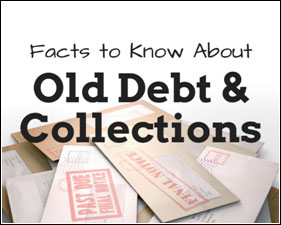6 Ways Not to Reset the Clock on Old Debt
Everyone makes mistakes, but when mistakes are committed pertaining to financial decisions, the consequences have a tendency to be more far reaching. For instance, things like foreclosure, bankruptcy and old debt can stay on your credit report and impact your credit score for many years before it is essentially erased from your record. While it’s possible to enact credit repair strategies while you wait for the clock to expire on these negatives, your score likely won’t see the boost that you’re looking for until time expires on the debt. It’s important for consumers to be aware of the statute of limitations pertaining to debt in their particular state – but it’s also just as important for consumers to be aware of a variety of no-no’s that could potentially restart the clock on old debt, keeping it on your record for many more years. This post will take a look at several of these things to stay away from so you don’t restart the clock on old debt that is soon to expire.
How Not to Reset the Clock on Old Debt
- Watch the Clock: There are two “clocks” you need to be aware of – the statute of limitations clock and the credit report clock. The former varies by state, is usually anywhere from three to six years and basically sets a timeframe for how long collections may be forced on a debt. The credit report clock dictates how long old debt can stay on your record, which is seven years.
- Know the Default Date: Seven years after you’ve defaulted on a debt, it must come off your credit report. Be sure you know this date and build good credit, as your score will likely progress the closer you get to the seven year mark. Judgments are the exception, as they can stay on your report up to seven years from the filing date.
- Be Careful with Collectors: A debt collector’s job is to get you to settle or make payments on a debt. Some try to accomplish this by any means necessary. Be careful what you say if you choose to speak with them, as just an admittance that the debt is yours can essentially tick the clock back to the start.
- Tell Collectors to Stop: If you’re being pestered by debt collectors, it’s your right to tell them to stop. This can be an ideal way to avoid a possible slip up – just be sure not to admit the debt is yours when you contact them.
- Be Wary of Payment Options: Many collectors will offer the option of paying off a debt for a lesser amount than what you actually owe. Be wary of paying off debt and always be sure you have confirmation that it was paid in full if you proceed with such an option.
- Hire a Lawyer: If you ever believe you’re in the wrong, seek legal representation.








 What is “Not Collectible Status? One way or the other, the IRS is going to get the money that you owe it. If you owe taxes, preferably, the IRS will receive this payment during tax season following the completion and submission of your annual tax return. But for some people that either owe taxes, have fallen behind on taxes or have just flat-out stopped filing tax returns, the fact is that they may not have the financial means to keep up with what they owe to the
What is “Not Collectible Status? One way or the other, the IRS is going to get the money that you owe it. If you owe taxes, preferably, the IRS will receive this payment during tax season following the completion and submission of your annual tax return. But for some people that either owe taxes, have fallen behind on taxes or have just flat-out stopped filing tax returns, the fact is that they may not have the financial means to keep up with what they owe to the